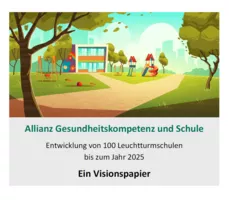Alliance for Health Literacy in Schools

The Alliance for Health Literacy in Schools is an alliance of relevant partners committed to the goal of developing and systematically implementing a coordinated strategy for the holistic promotion of health literacy in schools. This Alliance is an intersectoral network with partners from the education, health and social sectors, and works together equally and interdisciplinary in order to implement its vision. Implementing the vision requires linking health literacy, school-based health promotion and (digital) education. The aim is to anchor health literacy at the level of teaching, school staff, school organization and the wider school environment, and to develop quality standards for health literacy in the school setting. The Alliance follows existing initiatives on health literacy in Germany. Since 2018, the "National Action Plan on Health Literacy" (NAP) has been in place, which defines schools and education in particular as important venues for strengthening health literacy.
A few years earlier, the Alliance for Health Literacy was launched by the German Federal Ministry of Health, which also establishes important school- and education-related links. The Alliance for Health Literacy in Schools, therefore, will be aiming at strengthening the cooperation with these two initiatives in the coming years.
Initiators and founding members
The Alliance for Health Literacy in Schools was founded in 2020 by Prof. Dr. Orkan Okan (TUM), Prof. Dr. Kevin Dadaczynski (Hochschule Fulda), Prof. Dr. Klaus Hurrelmann (Hertie School Berlin), Ulrike Koller (Helmholtz Munich) und Verena Braun (Helmoltz Munich).

The Alliance for Health Literacy in School is based on following premise:
Early educational interventions and health promotion and prevention measures at school are more sustainable, because in schools all school-aged children can be reached easily in order to target knowledge and skill development as well as promote healthy behaviors, that are only difficult to change once in adulthood. Health literacy is often referred to as a determinant of health (sometimes also as a social and/or critical determinant of health, a mediator, a moderator or even a main health effect). In any case, health literacy is a factor that impacts health and it is one of the few factors that can be improved through educational interventions, particularly in schools. Addressing health literacy as part of behavioural approach is one side of the prevention coin, the other being integrating health literacy into a structural health promotion approach and improving the environments children and adolescents live and grow up in, and of which the school is part of.
The Alliance for Health Literacy in Schools requires:
- to gather relevant actors from science, policy and practice, who are committed to health literacy in schools and take a lead role as agents and advocates
- to create a network and regular exchange with representatives from education policy (ministries of education and school authorities) and health policy (e.g. BMG and subordinate authorities at federal and state levels)
- to analyse and understand enabling factors and barriers of already existing school health networks, especially in school health promotion
- to promote and strengthen research in different areas related to health in the school setting (classroom teaching, personnel, organization, school environment)
- to develop and implement a communication and action strategy that uses the language of education and health equally
- to implement a strategy to develop, test, evaluate and disseminate good health literacy practices in schools
Thinking together health literacy and school
Addressing the competencies that enable children and adolescent to find, understand, critically reflect and apply health information to maintain and promote one's own health can be understood as a core concern of school: the educational mission and core task of schools is to promote competencies and knowledge that allow children and adolescents to become literate in the information society and able to manage information in a way that helps them to using information to influence their own and others well-being and health. Conversely and from a systemic point of view, teaching and learning processes must be analyzed at the classroom level as well as at the school level and they must be designed in the sense of a continuous development process in order to successfully promote health literacy in the whole setting and to sustainably anchor it in the school.
While education and academic competencies impact health outcomes, health also has an effect on education, so health and education have to be understood as reciprocal. Research findings indicate, for example, that good health and healthy behavior can have a positive effect on, among other things, school motivation and academic performance. Therefore, health literacy should not be viewed seperate from educational outcomes. Even though only few research results are available so far, at least an indirect effect of health literacy on educational success through the factor health can be assumed as well (as shown in the SHE Fact Sheet on health literacy). Prospectively, this issue must be a matter of intensive investigation in order to better understand underlying mechanisms and causal relationships between health, education and health literacy, and use this knowledge to develop effective measures.
Benefit from experience made with school health promotion
Developing and strengthening health literacy in schools must be part of a holistic school health promotion approach. While health literacy is still a relatively new topic in schools, many schools in Germany already implement health promotion and prevention measures in a comprehensive way, as recommended in the Ottawa Charter of the World Health Organization. With the health promoting school approach, numerous scientific findings, practical experiences and structures exist in the German education system at the local, state and federal levels. Health literacy must build on and be integrated into these structures and experiences. Ultimately, both approaches health literacy and school health promotion pursue the same basic concern and similar goals. The establishment of parallel structures should therefore be avoided, in particular regarding content to be addressed and limited resources.
